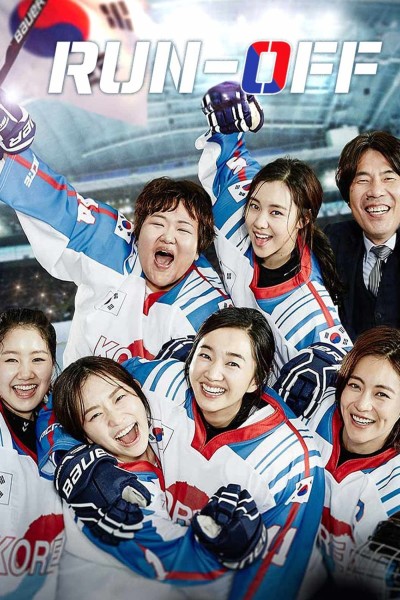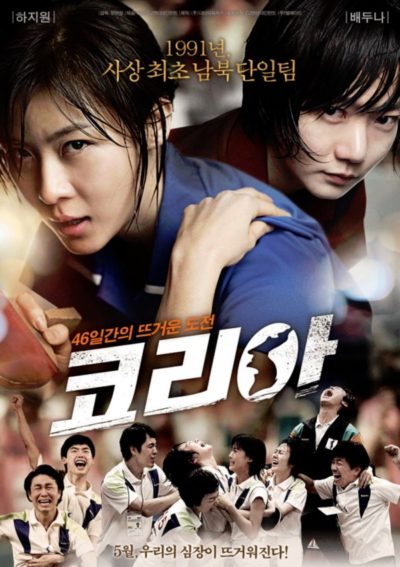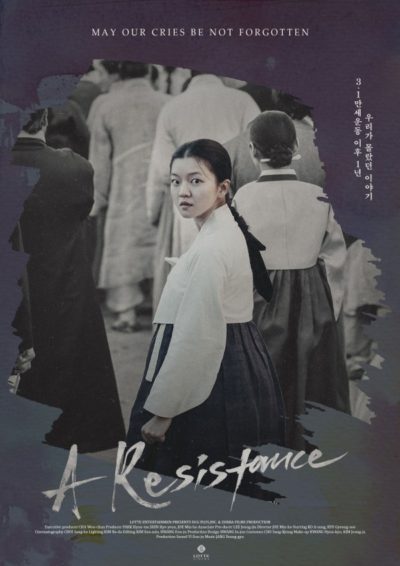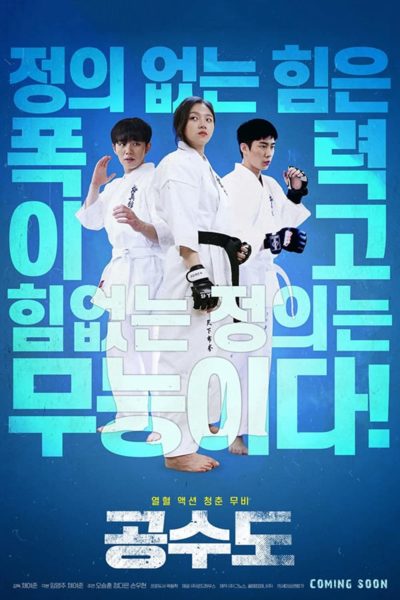★★½
“Good only in car parts.”
 Based on the trailer, I was hoping for something like a Korean version of The Transporter. It seemed to promise this, with Jang Eun-ha (Park) playing a courier for Baekgang Industries, a company who will transport things – mostly people, it appears – from Point A to Point B, when regular delivery methods are not possible. For example, because the passenger in question is being chased by enemies, and needs to make a quick exit from the country before he’s found. Her latest mission involves baseball pitcher Kim Doo-shik, who has blown the whistle on a match-fixing scandal, so needs to escape before those behind it get hold of him and young son Kim Seo-won (Jung).
Based on the trailer, I was hoping for something like a Korean version of The Transporter. It seemed to promise this, with Jang Eun-ha (Park) playing a courier for Baekgang Industries, a company who will transport things – mostly people, it appears – from Point A to Point B, when regular delivery methods are not possible. For example, because the passenger in question is being chased by enemies, and needs to make a quick exit from the country before he’s found. Her latest mission involves baseball pitcher Kim Doo-shik, who has blown the whistle on a match-fixing scandal, so needs to escape before those behind it get hold of him and young son Kim Seo-won (Jung).
So far, so sprightly, especially after an enthralling early sequence which showcases Eun-ha’s mad driving skills in avoiding pursuers through the narrow streets of Busan. However, the attempted pick-up of Kim Sr. goes badly awry, as he’s being chased by Jo Kyung-pil (Song). Jo is a corrupt cop who is also behind the gambling ring involved in the match-fixing. Eun-ha ends up in possession of Seo-won, and… Hang on, didn’t we write about three different versions of this story in October 2022? Yeah, for much of the rest of the film is basically another take on Gloria. Brash, beer-drinking Eun-ha is lumbered with a kid whom she cannot initially stand, yet inevitably, comes to care for Seo-won over the remaining course of the film.
Now, this isn’t all that different from The Transporter, where Jason Statham was also lumbered with an unwanted human package, in his case Shu Qi. However, there, it was the jumping off point for some cool and generally entertaining action, e.g. the classic garage fight, involving a well-oiled Statham. Here, not nearly so much, even though Jo is keen to get hold of the kid, who has a computer dongle which is key to the recovery of $30 million. While this could have been the source of multiple exciting car-chases – and as the opening shows, technically, the makers were more than capable – it feels as if director Park is more interested in how suddenly enforced maternal responsibility changes his heroine. I can’t say I’m with him there.
The concept can work, but seems incredibly trite here, and doesn’t help matters that Seo-won is a very generic child, with little personality compared, say, to Newt in Aliens, or Mathilda in The Professional. Consequently, Eun-ha’s decision not to drop the child off at the nearest police-station seems contrived for plot purposes, rather than resulting from a natural release of suppressed nurturing emotions. It’s well-enough assembled that it never becomes unwatchable, yet proceedings remain just that: assembled. It’s not without merit, since both protagonist and antagonist make for interesting characters. But it the end, Chris described it as “cute,” and that’s borderline damning with faint praise in her vocabulary – one step above “interesting.” I can’t honestly say she was wrong in her assessment.
Dir: Park Dae-min
Star: Park So-dam, Song Sae-byeok, Kim Eui-sung, Jung Hyeon-jun





 It feels as if South Korea is going through all the Olympic sports, making films based on each of them. Indeed, this film’s alternate title makes it a sequel to Take Off, about ski-jumping. I’ve seen two of the previous entries, covering archery (
It feels as if South Korea is going through all the Olympic sports, making films based on each of them. Indeed, this film’s alternate title makes it a sequel to Take Off, about ski-jumping. I’ve seen two of the previous entries, covering archery ( After the bombing of a South Korean jet by North Korean agents in 1987, relations between the two nations sank to perilously low levels. In an effort to help mend fences, the countries agreed to join forces and send a unified squad to the 1991 World Table Tennis Championship in Japan, to take on the all-powerful Chinese. The process was not without its bumps, as the South’s star player, Hyun Jung-hwa (Ha), and her counterpart in the North, Ri Bun-hui (Bae), struggle to overcome their differences and become a cohesive doubles partnership. Their respective coaches (Park and Kim) also have to learn to navigate shoals both sporting and political on the way to the gold medal match in Tokyo.
After the bombing of a South Korean jet by North Korean agents in 1987, relations between the two nations sank to perilously low levels. In an effort to help mend fences, the countries agreed to join forces and send a unified squad to the 1991 World Table Tennis Championship in Japan, to take on the all-powerful Chinese. The process was not without its bumps, as the South’s star player, Hyun Jung-hwa (Ha), and her counterpart in the North, Ri Bun-hui (Bae), struggle to overcome their differences and become a cohesive doubles partnership. Their respective coaches (Park and Kim) also have to learn to navigate shoals both sporting and political on the way to the gold medal match in Tokyo. I should be clear, this is not to be confused with
I should be clear, this is not to be confused with  This is definitely an interesting idea, and potentially the most meta action heroine film I’ve seen. Cha Yeon-hee (Ahn) has wanted to be a movie heroine ever since she was a child, though it’s an ambition which has always eluded her – in part because of her refusal to work her way up in the industry. She eventually and grudgingly accepts a stunt double position in a historical swordplay film, and shows up on the set for her first day. However, due to circumstances involving a magical clapperboard (hence the title) and an inconvenient portal, she finds herself transported to a parallel dimension. It’s kinda like modern Korea in clothes and speech, but run by warlords and their sword-carrying minions.
This is definitely an interesting idea, and potentially the most meta action heroine film I’ve seen. Cha Yeon-hee (Ahn) has wanted to be a movie heroine ever since she was a child, though it’s an ambition which has always eluded her – in part because of her refusal to work her way up in the industry. She eventually and grudgingly accepts a stunt double position in a historical swordplay film, and shows up on the set for her first day. However, due to circumstances involving a magical clapperboard (hence the title) and an inconvenient portal, she finds herself transported to a parallel dimension. It’s kinda like modern Korea in clothes and speech, but run by warlords and their sword-carrying minions. There’s a lot to admire about this South Korean film, though a couple of fumbles stop it from achieving the heights it threatens to do. You’d be forgiven for thinking it’s a knock-off of Kill Bill going by the title. But it’s as much a pun on the name of the heroine, Gil Bok-soon (Jeon). She has been an assassin since she was 17, and has worked her way up to be the top employee of the MK. ENT corporation, run by Cha Min-kyu (Sol). They are one of a number of competing companies offering killers for hire, but to ensure standards, certain common rules have been agreed, e.g. no kids, and are adhered to by all. Well… Kinda…
There’s a lot to admire about this South Korean film, though a couple of fumbles stop it from achieving the heights it threatens to do. You’d be forgiven for thinking it’s a knock-off of Kill Bill going by the title. But it’s as much a pun on the name of the heroine, Gil Bok-soon (Jeon). She has been an assassin since she was 17, and has worked her way up to be the top employee of the MK. ENT corporation, run by Cha Min-kyu (Sol). They are one of a number of competing companies offering killers for hire, but to ensure standards, certain common rules have been agreed, e.g. no kids, and are adhered to by all. Well… Kinda… This showed up as a bit of a surprise. Obviously, even the title suggested that the makers were looking for a sequel to
This showed up as a bit of a surprise. Obviously, even the title suggested that the makers were looking for a sequel to  This takes place in 1919-20, when Korea was under occupation by the Japanese [there seems to be quite a lot of this about; I’ve seen a bunch of Chinese movies set when that country was occupied by Japan as well]. Even demonstrating against the Japanese, or in favour of Korean independence, was sternly forbidden, with those taking part likely to be arrested and thrown in prison for months. If they were lucky, that is: an opening caption tells us 7,500 were killed in the protests or died in jail subsequently. Even for those merely arrested, this was not a “nice” prison, to put it mildly, with horrendously over-crowded conditions (24 to a cell!), freezing temperatures and meagre rations.
This takes place in 1919-20, when Korea was under occupation by the Japanese [there seems to be quite a lot of this about; I’ve seen a bunch of Chinese movies set when that country was occupied by Japan as well]. Even demonstrating against the Japanese, or in favour of Korean independence, was sternly forbidden, with those taking part likely to be arrested and thrown in prison for months. If they were lucky, that is: an opening caption tells us 7,500 were killed in the protests or died in jail subsequently. Even for those merely arrested, this was not a “nice” prison, to put it mildly, with horrendously over-crowded conditions (24 to a cell!), freezing temperatures and meagre rations. This is as much about the philosophical underpinnings of karate, and how it can be used for personal growth. The instigator in this case is Chae-yeong (Jung), a teenage girl who has just transferred to a new school after issues at her previous educational establishment. Her long-suffering father, a karate master has barely registered her there, when trouble finds Chae-yeong. She uses her skills to rescue a student, Jong-goo (Oh), who is refusing to help some bullies cheat in an upcoming exam. This turns out to get her an unwanted high profile, as the school is basically a gangsters’ paradise.
This is as much about the philosophical underpinnings of karate, and how it can be used for personal growth. The instigator in this case is Chae-yeong (Jung), a teenage girl who has just transferred to a new school after issues at her previous educational establishment. Her long-suffering father, a karate master has barely registered her there, when trouble finds Chae-yeong. She uses her skills to rescue a student, Jong-goo (Oh), who is refusing to help some bullies cheat in an upcoming exam. This turns out to get her an unwanted high profile, as the school is basically a gangsters’ paradise. This probably falls into the category of lightly amusing, rather than anything more. But I can’t say I was ever bored, and it’s assembled well enough technically that I can’t complain. The heroine is Mi-Young (Uhm), a former North Korean agent, who defected, changed her looks through plastic surgery, and now lives a quiet existence, with a part-time job selling pastries in the local market. She’s married to Seok-Hwan (Park), a computer repairman, and their life is frugal as far as wealth goes. Seok-Hwan, however, is wins a promotion run by a soft-drink company, getting them and their young daughter a trip to Hawaii.
This probably falls into the category of lightly amusing, rather than anything more. But I can’t say I was ever bored, and it’s assembled well enough technically that I can’t complain. The heroine is Mi-Young (Uhm), a former North Korean agent, who defected, changed her looks through plastic surgery, and now lives a quiet existence, with a part-time job selling pastries in the local market. She’s married to Seok-Hwan (Park), a computer repairman, and their life is frugal as far as wealth goes. Seok-Hwan, however, is wins a promotion run by a soft-drink company, getting them and their young daughter a trip to Hawaii.